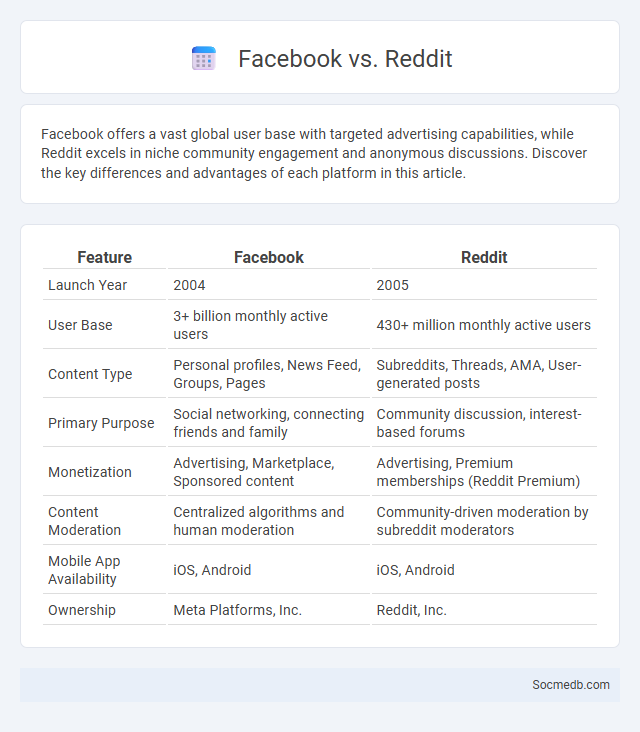
Photo illustration: Facebook vs Reddit
Facebook offers a vast global user base with targeted advertising capabilities, while Reddit excels in niche community engagement and anonymous discussions. Discover the key differences and advantages of each platform in this article.
Table of Comparison
| Feature | ||
|---|---|---|
| Launch Year | 2004 | 2005 |
| User Base | 3+ billion monthly active users | 430+ million monthly active users |
| Content Type | Personal profiles, News Feed, Groups, Pages | Subreddits, Threads, AMA, User-generated posts |
| Primary Purpose | Social networking, connecting friends and family | Community discussion, interest-based forums |
| Monetization | Advertising, Marketplace, Sponsored content | Advertising, Premium memberships (Reddit Premium) |
| Content Moderation | Centralized algorithms and human moderation | Community-driven moderation by subreddit moderators |
| Mobile App Availability | iOS, Android | iOS, Android |
| Ownership | Meta Platforms, Inc. | Reddit, Inc. |
Introduction: Comparing Facebook, Reddit, and Third-Party Apps
Facebook offers a vast social networking platform emphasizing personal connections and multimedia sharing, while Reddit centers on community-driven discussions and niche interest groups through its subreddit structure. Third-party social media apps often provide specialized features such as enhanced privacy, content curation, or unique user interfaces catering to diverse user preferences. Understanding the distinct functionalities and user experiences of Facebook, Reddit, and various third-party apps helps optimize social media engagement strategies.
User Interface and Experience Differences
Social media platforms differ significantly in user interface (UI) and user experience (UX) design, with Instagram emphasizing visual storytelling through image grids and Stories features, enhancing ease of navigation for content discovery. Twitter prioritizes real-time updates with a streamlined feed focused on text and threaded conversations, facilitating quick information exchange and engagement. Facebook integrates diverse functionalities like groups, marketplace, and live video, offering a multifaceted experience that caters to varied user interactions but may present a more complex interface.
Community Engagement and Moderation
Effective community engagement on social media drives user interaction, fosters brand loyalty, and boosts organic reach through targeted content and timely responses. Moderation ensures a safe and respectful environment, reducing harmful content and enhancing user trust by applying consistent guidelines and AI-driven tools. Platforms like Facebook, Instagram, and Twitter leverage automated moderation combined with human oversight to balance vibrant discussions with community standards compliance.
Privacy and Data Security Features
Social media platforms have integrated advanced privacy and data security features such as end-to-end encryption, two-factor authentication, and customizable privacy settings to protect user information. These tools empower you to control who can access your data, monitor account activity, and reduce exposure to cyber threats. Consistent updates and compliance with data protection regulations ensure robust defense against unauthorized data breaches and identity theft.
Content Discovery and Algorithms
Social media platforms use advanced algorithms to personalize content discovery, ensuring Your feed presents relevant posts based on your interaction history and preferences. These algorithms analyze data such as likes, shares, comments, and browsing behavior to curate tailored content that increases engagement and time spent on the platform. Understanding how algorithm-driven content discovery works can enhance Your ability to find trending topics and connect with communities aligned with Your interests.
Platform Monetization and Advertising
Social media platforms offer diverse opportunities for platform monetization through targeted advertising, sponsored content, and affiliate marketing programs tailored to maximize revenue. Your business can leverage advanced data analytics and user behavior insights to optimize ad placements and increase engagement rates, resulting in higher conversion and return on investment (ROI). Effective social media advertising strategies utilize demographic segmentation and algorithm-driven personalization to reach the right audience with compelling, relevant messaging.
Customization and Personalization Options
Social media platforms offer extensive customization and personalization options to enhance Your user experience by tailoring content, notifications, and privacy settings. These features utilize algorithms that analyze Your interests, behavior, and interactions to deliver relevant posts, advertisements, and friend suggestions. By adjusting these settings, You can control the visibility of Your profile and curate a feed that aligns with Your preferences.
Content Creation and Sharing Tools
Content creation and sharing tools on social media platforms empower users to produce, edit, and distribute multimedia content seamlessly. Features such as video editing, live streaming, and story formats enhance user engagement and facilitate real-time interaction. These tools optimize visibility through algorithms that prioritize creative and shareable content, driving organic reach and community growth.
User Demographics and Audience Insights
Social media platforms attract diverse user demographics, with Facebook boasting over 2.9 billion monthly active users predominantly aged 25 to 34, while TikTok's fastest-growing segment includes users aged 18 to 24. Audience insights reveal key behaviors such as peak engagement times, content preferences like video or carousel posts, and interaction rates, guiding marketers to tailor strategies for higher conversion. Understanding demographic data combined with platform-specific analytics enhances targeted advertising, boosts brand resonance, and optimizes campaign ROI.
Pros, Cons, and Best Use Cases
Social media offers unparalleled opportunities for real-time communication, brand building, and customer engagement, making it essential for businesses and individuals seeking visibility. However, it also poses risks such as privacy concerns, misinformation spread, and potential addiction, which require mindful management. Your best use cases include targeted marketing campaigns, community building, and sharing valuable content to foster genuine connections and drive growth.
 socmedb.com
socmedb.com